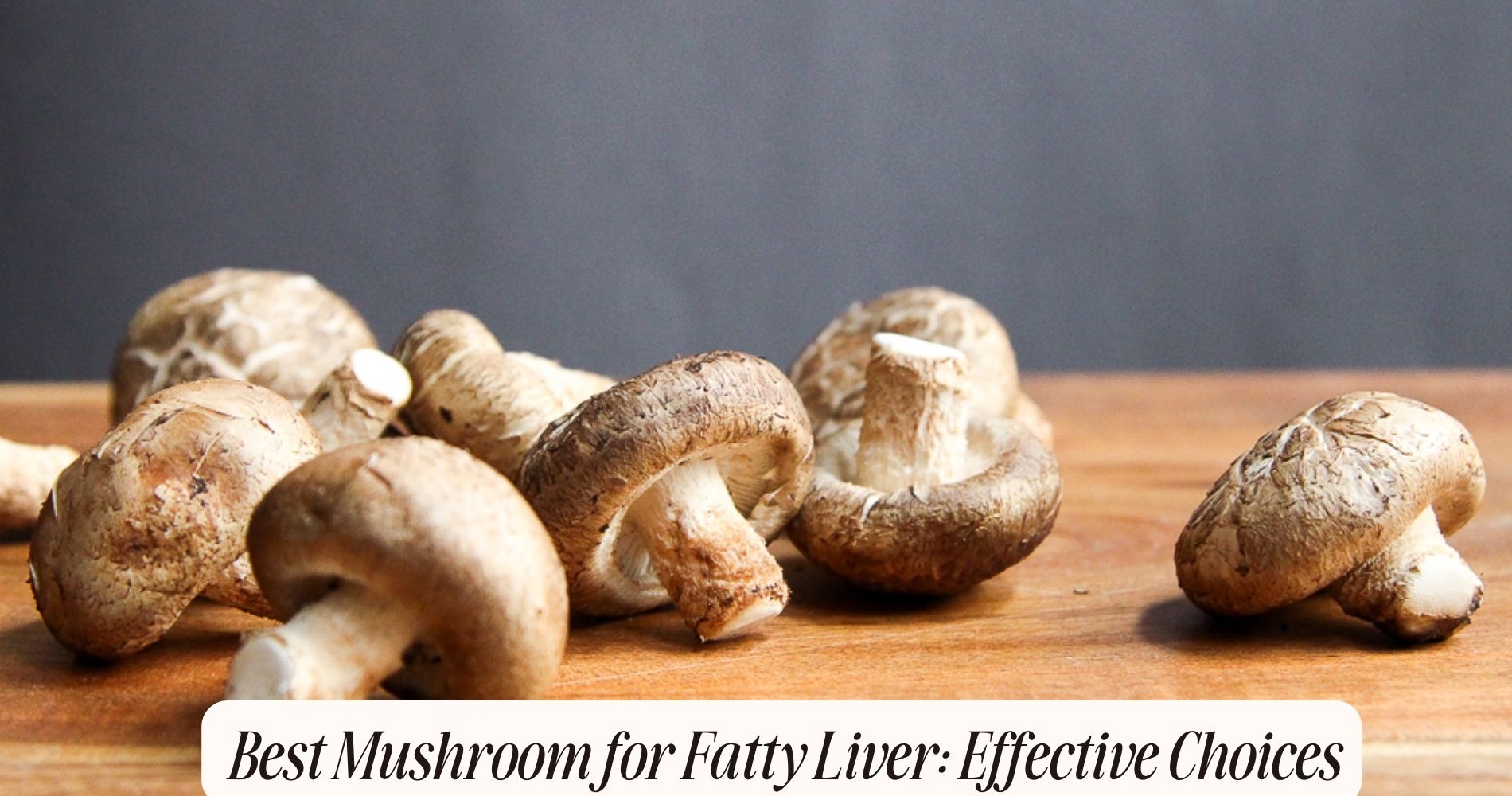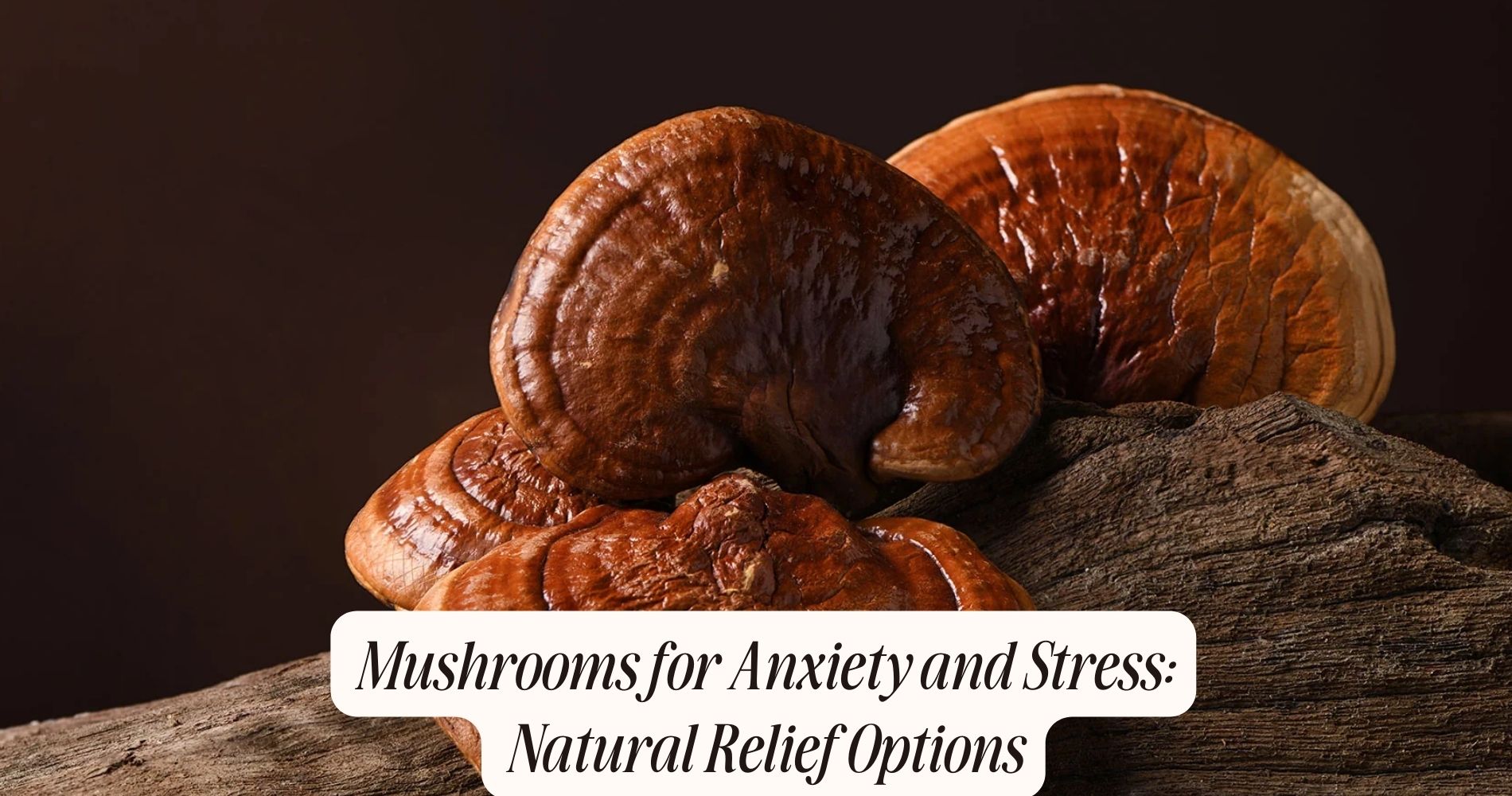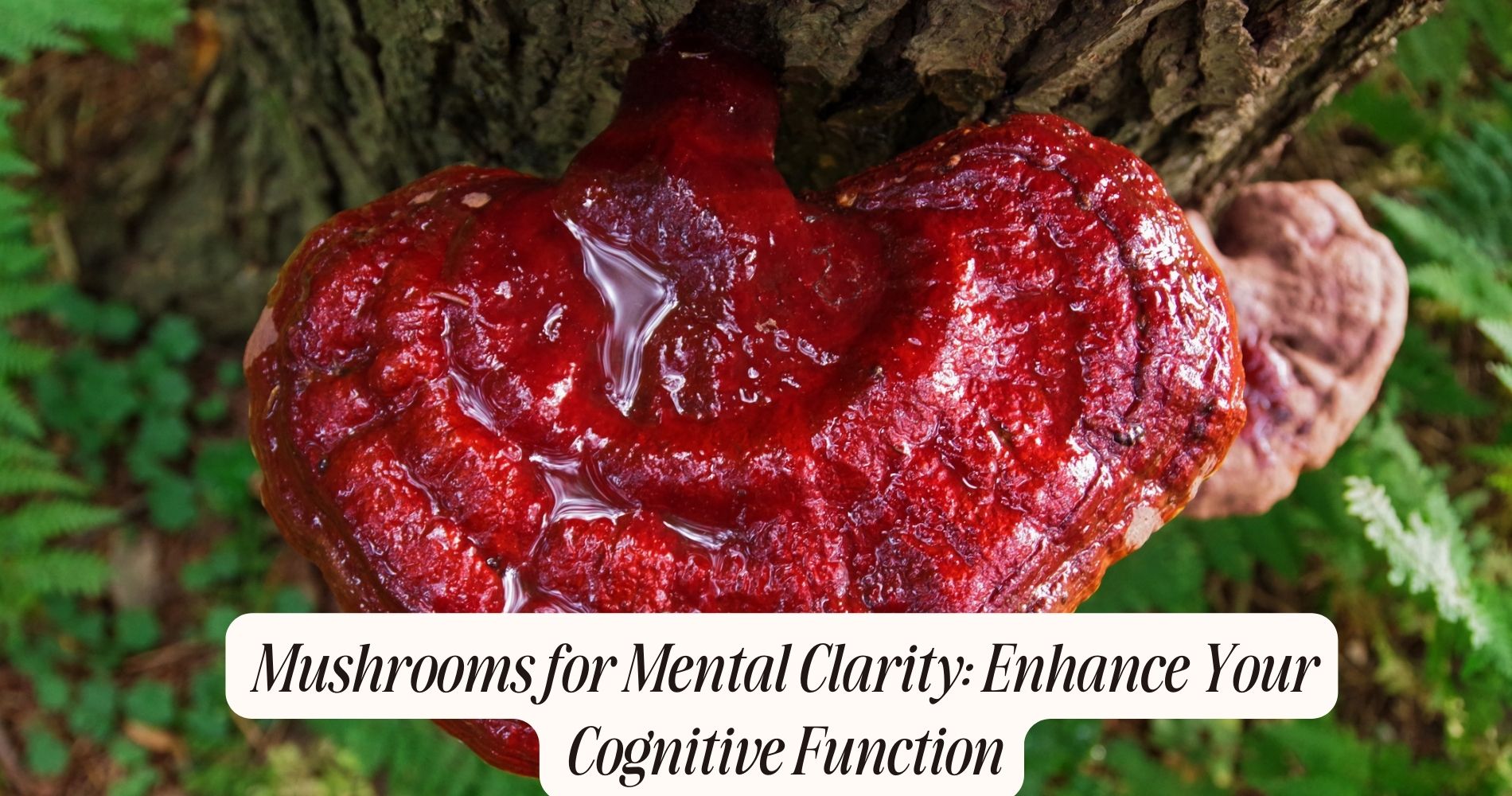
Best Mushroom for Fatty Liver: Effective Choices
Shiitake
Shiitake mushrooms, rich in bioactive compounds like polysaccharides and eritadenine, can greatly support liver health and mitigate fatty liver disease. These compounds have demonstrated hepatoprotective effects, reducing liver enzymes and improving lipid metabolism. Polysaccharides in shiitake mushrooms bolster immune function, supporting the liver's ability to detoxify and repair itself. Eritadenine, on the other hand, aids in lowering cholesterol levels, a vital factor in managing fatty liver disease.

Incorporating shiitake mushrooms into your diet isn't only beneficial for your liver but also versatile in the kitchen. Shiitake culinary uses range from stir-fries and soups to grilled dishes and salads, making them an easy addition to various meals. Their rich, umami flavor enhances the taste profile of your dishes while providing significant health benefits.
From a nutritional standpoint, shiitake mushrooms are low in calories but high in essential nutrients. Their nutritional profile includes vitamins such as B2, B5, and D, along with minerals like selenium, zinc, and manganese. These nutrients contribute to overall liver function and systemic health, making shiitake mushrooms a strategic choice for those aiming to manage or prevent fatty liver disease.
Reishi
Reishi mushrooms, known for their potent bioactive compounds like triterpenoids and polysaccharides, offer significant hepatoprotective benefits, making them an effective option for managing fatty liver disease.
Research indicates that these compounds exert antioxidative, anti-inflammatory, and immunomodulatory effects, which are essential in mitigating liver damage and promoting liver health.
You'll find that reishi benefits extend to reducing hepatic lipid accumulation. This is particularly beneficial for individuals with non-alcoholic fatty liver disease (NAFLD), where lipid overload disrupts normal liver function.
By enhancing the liver's antioxidant capacity and reducing oxidative stress, reishi mushrooms help prevent further liver damage. Additionally, they modulate inflammatory pathways, thereby decreasing liver inflammation and fibrosis, which are common complications in advanced fatty liver disease.

When considering reishi dosage, clinical studies often use a range between 1.5 to 9 grams of dried mushroom extract per day.
However, it's important to consult with a healthcare provider to determine an appropriate dosage tailored to individual needs and medical conditions.
Adhering to recommended reishi dosage guarantees you maximize the therapeutic benefits while minimizing potential side effects, such as gastrointestinal discomfort.
Maitake
Maitake mushrooms, rich in polysaccharides like beta-glucans, have shown promising hepatoprotective properties that can aid in managing fatty liver disease. Clinical studies indicate that beta-glucans can modulate immune responses and reduce oxidative stress, both critical factors in liver health. By enhancing the body's antioxidant defenses, maitake mushrooms help mitigate liver inflammation and fibrosis, common issues in fatty liver disease.
The maitake benefits extend beyond merely combating inflammation. They also improve lipid metabolism by modulating the liver's fat storage mechanisms. This means you'll find your liver better equipped to handle and process fats, reducing the fat accumulation that characterizes fatty liver disease. Additionally, maitake mushrooms exhibit anti-diabetic properties, which can be particularly beneficial given the frequent comorbidity of diabetes and fatty liver disease.

Incorporating maitake into your diet doesn't have to be complicated. Numerous maitake recipes can seamlessly fit into your daily meals. For instance, you can sauté maitake mushrooms with garlic and olive oil for a simple, nutritious side dish. Alternatively, add them to soups or stews to enhance both flavor and health benefits. By including maitake in your diet, you can leverage their potent hepatoprotective properties for better liver health.
Cordyceps
Cordyceps mushrooms, known for their bioactive compounds like cordycepin, offer potent hepatoprotective effects that can markedly benefit individuals managing fatty liver disease.
Clinical studies have demonstrated that cordycepin exhibits anti-inflammatory and antioxidant properties, which are vital in mitigating liver inflammation and oxidative stress—key contributors to the progression of fatty liver disease.
Incorporating Cordyceps into your regimen can enhance liver function by improving lipid metabolism and reducing hepatic fat accumulation.
The Cordyceps benefits extend to modulating immune responses, thereby preventing further liver damage. Research shows that Cordyceps can effectively lower serum alanine aminotransferase (ALT) and aspartate aminotransferase (AST) levels, markers of liver damage, indicating its therapeutic potential.

When it comes to Cordyceps dosage, standardized extracts typically recommend 1,000 to 3,000 milligrams per day, divided into two or three doses.
However, it's important to consult with a healthcare provider to tailor the dosage to your specific needs and conditions. This guarantees you receive the maximum therapeutic benefits while minimizing potential risks or interactions with other medications.
Incorporating Cordyceps into a thorough treatment plan for fatty liver disease can offer a multifaceted approach to improving liver health and overall well-being.
Turkey Tail
Turkey Tail mushrooms, rich in polysaccharopeptides like PSK and PSP, offer significant immunomodulatory and hepatoprotective benefits that can be instrumental in managing fatty liver disease.
These compounds have been shown to enhance immune function by activating macrophages and natural killer cells, which can help in reducing hepatic inflammation and fibrosis.
From a clinical perspective, incorporating Turkey Tail into your regimen could provide a multifaceted approach to managing fatty liver.
The hepatoprotective properties of Turkey Tail benefits stem from its ability to modulate cytokine production, reducing oxidative stress and promoting liver regeneration.

Clinical studies indicate that consistent use of Turkey Tail may improve liver enzyme levels, thereby aiding in the overall function of your liver.
When considering turkey tail dosage, it's essential to adhere to evidence-based guidelines.
Typically, a daily dosage of 1.5 to 3 grams of dried Turkey Tail extract is recommended.
This dosage guarantees you receive the therapeutic benefits without overwhelming your system.
Always consult with your healthcare provider before starting any new supplement, particularly if you have pre-existing conditions or are taking other medications.
Chaga
Chaga mushrooms, renowned for their high antioxidant content, play an essential role in reducing oxidative stress and protecting liver cells in individuals with fatty liver disease. You'll find that chaga benefits stem from its rich composition of polysaccharides, betulinic acid, and polyphenols, which collectively help modulate the immune response and combat inflammation.

When you consider incorporating chaga supplements into your regimen, it's vital to understand their hepatoprotective properties. Clinical studies suggest chaga's antioxidants, particularly superoxide dismutase and glutathione peroxidase, considerably mitigate lipid peroxidation in liver tissues. This action helps in stabilizing cell membranes and preventing liver damage.
Moreover, chaga's polysaccharides enhance the liver's detoxification pathways, aiding in the efficient removal of toxins and reducing hepatic burden. Additionally, betulinic acid, a triterpenoid found in chaga, exhibits antiviral and anti-inflammatory activities, which can further support liver health by reducing liver inflammation and fibrosis.
You should consult healthcare professionals before starting chaga supplements, especially if you have underlying conditions or are on medication. Ensuring the correct dosage and form of chaga can optimize its therapeutic potential while minimizing any adverse effects.
As a result, chaga mushrooms offer substantial benefits for managing fatty liver disease through their antioxidative and anti-inflammatory properties.
Lion's Mane
Lion's Mane offers significant benefits for liver health, primarily through its anti-inflammatory properties that can mitigate hepatic inflammation.
You'll also find it supports cognitive function, which is particularly beneficial given the brain-liver axis.
Clinical studies suggest that its bioactive compounds promote liver regeneration and reduce oxidative stress.
Liver Health Benefits
Emerging research highlights that compounds in Lion's Mane mushroom can considerably support liver health by reducing oxidative stress and inflammation.
You'll find that this mushroom possesses potent antioxidant properties, which play a significant role in neutralizing free radicals and protecting liver cells from oxidative damage. This is particularly important because oxidative stress is a notable factor in liver diseases, including fatty liver.
Moreover, Lion's Mane enhances metabolic support by modulating lipid metabolism. It's been shown to reduce lipid accumulation in liver cells, thereby mitigating one of the primary causes of fatty liver disease. Clinical trials have demonstrated that Lion's Mane can improve liver enzyme levels, indicating better liver function and reduced hepatic stress.
In addition to its direct liver benefits, Lion's Mane also supports overall metabolic health, which indirectly benefits the liver. By improving insulin sensitivity and reducing blood glucose levels, it helps in managing conditions like diabetes and metabolic syndrome, both of which are risk factors for fatty liver disease.
Anti-Inflammatory Properties
Studies have shown that the bioactive compounds in Lion's Mane mushroom exhibit significant anti-inflammatory effects, making it a promising candidate for managing inflammation-related liver conditions.
When you consider the pathophysiology of fatty liver disease, inflammation plays a key role. Lion's Mane contains polysaccharides and hericenones, which are known to modulate the immune system and reduce inflammatory cytokines. These bioactive molecules can downregulate pro-inflammatory pathways, thereby alleviating hepatic inflammation.
In clinical settings, reducing inflammation is essential for preventing the progression of liver disease to more severe stages like fibrosis or cirrhosis. Lion's Mane's ability to regulate immune responses and decrease oxidative stress can help manage these conditions effectively.
Studies have demonstrated that this mushroom's anti-inflammatory properties can inhibit the nuclear factor kappa-light-chain-enhancer of activated B cells (NF-κB) pathway, a critical regulator of inflammatory responses.
Cognitive Function Support
Intriguingly, research has shown that the bioactive compounds in Lion's Mane mushroom enhance cognitive function by promoting nerve growth factor (NGF) synthesis. NGF is vital for the maintenance, survival, and regeneration of neurons, which directly impacts cognitive enhancement and brain health. By stimulating NGF production, Lion's Mane potentially mitigates neurodegenerative conditions such as Alzheimer's disease and mild cognitive impairment.
Studies indicate that erinacines and hericenones, the primary active compounds in Lion's Mane, cross the blood-brain barrier to exert neuroprotective effects. These compounds support synaptic plasticity and facilitate neuronal communication, essential for memory retention and cognitive performance.
For individuals with fatty liver disease, the anti-inflammatory properties of Lion's Mane can also reduce hepatic encephalopathy risk, a condition characterized by cognitive decline due to liver dysfunction.
Clinical trials reveal that daily supplementation with Lion's Mane can improve cognitive function in older adults, suggesting its potential as a therapeutic agent for age-related cognitive decline. It's important to consult healthcare professionals before incorporating Lion's Mane into your regimen, especially if you have underlying health conditions or are on medication.
Nonetheless, Lion's Mane presents a promising avenue for cognitive enhancement and overall brain health.
Oyster Mushrooms
You should consider incorporating oyster mushrooms into your diet because they're nutrient-rich and offer significant health benefits for managing fatty liver.
Research indicates that oyster mushrooms contain compounds that support liver detoxification processes, potentially reducing hepatic steatosis.
Additionally, their antioxidant properties can help mitigate oxidative stress, a key factor in liver disease progression.
Nutrient-Rich Health Benefits
Oyster mushrooms provide a rich source of essential nutrients and bioactive compounds beneficial for managing fatty liver disease. These mushrooms are packed with antioxidants like ergothioneine, which help mitigate oxidative stress—a key factor in liver damage. By neutralizing free radicals, oyster mushrooms' antioxidant properties can reduce hepatic inflammation and fibrosis.
From a clinical perspective, improving gut health is essential for managing fatty liver disease. Oyster mushrooms contain high levels of dietary fiber and prebiotic compounds like beta-glucans, which support a healthy gut microbiome. A balanced gut microbiota enhances nutrient absorption and reduces gut permeability, thereby lowering systemic inflammation that can exacerbate liver conditions.
These mushrooms are also a good source of essential nutrients such as B vitamins, selenium, and potassium, which are fundamental for maintaining overall metabolic health. B vitamins play a significant role in energy metabolism and liver function, while selenium acts as a co-factor for antioxidant enzymes, further bolstering your body's defense against oxidative stress.
Liver Detoxification Properties
In addition to their nutrient-rich profile, these mushrooms exhibit significant liver detoxification properties that can aid in managing fatty liver disease. Oyster mushrooms, in particular, are rich in bioactive compounds like polysaccharides and antioxidants, which enhance the liver's natural detoxification pathways. These compounds facilitate the breakdown and elimination of toxins, reducing hepatic stress.
Moreover, oyster mushrooms contribute positively to liver regeneration. The presence of ergothioneine, a potent antioxidant, aids in repairing damaged liver cells. Studies have shown that ergothioneine reduces oxidative stress, a major factor in liver damage and fatty liver disease progression. By mitigating oxidative damage, these mushrooms promote cellular repair and regeneration, essential for restoring liver function.
Incorporating oyster mushrooms into your diet can enhance liver detoxification pathways, supporting overall liver health. Their hepatoprotective properties make them a valuable addition to dietary interventions aimed at managing fatty liver disease. Clinical evidence supports the use of these mushrooms in reducing hepatic fat accumulation and promoting liver regeneration.
Boost Liver Health with SUPER MUSHROOM GUMMIES
As you explore the best mushroom for fatty liver, consider enhancing your wellness routine with Well Gummies' SUPER MUSHROOM GUMMIES. These easy-to-use gum chews feature a powerful blend of 10 functional mushrooms, designed to naturally fuel your brain and energize your body. Our vegan gummies deliver calmer energy, sharper focus, and robust immune support for a balanced body and clear mind. Enjoy the delightful taste of fresh wild berries, as delicious as your favorite candy, without any jitters or crashes. Shine all day with the natural benefits of SUPER MUSHROOM GUMMIES.
Frequently Asked Questions
Can Mushrooms Interact With Medications for Fatty Liver Disease?
Yes, mushrooms can interact with fatty liver medications. Certain compounds in mushrooms might affect drug metabolism, potentially altering the effectiveness or side effects of your treatment. Always consult your healthcare provider about potential mushroom interactions.
How Should Mushrooms Be Stored to Maintain Their Medicinal Properties?
To maintain medicinal properties, use proper storage techniques. Store mushrooms in a paper bag in the refrigerator to reduce moisture, preserving nutrients. Avoid plastic bags, as they promote spoilage and nutrient degradation.
Are There Any Side Effects of Consuming Medicinal Mushrooms Daily?
When you consume medicinal mushrooms daily, you might experience mild side effects like digestive discomfort or allergic reactions. While beneficial for liver detoxification, it's essential to monitor your daily dosage to avoid potential adverse effects.
Can Mushroom Supplements Be Used Instead of Fresh Mushrooms?
You can use mushroom supplements instead of fresh mushrooms. They offer similar mushroom benefits due to concentrated bioactive compounds. Clinical studies support supplement efficacy for health improvements, though fresh mushrooms provide additional dietary fiber and nutrients.
What Is the Best Way to Cook Mushrooms for Liver Health Benefits?
For liver health benefits, you should opt for sautéed mushrooms or mushroom broths. These methods preserve nutrients and enhance bioavailability. Clinical evidence suggests these preparations support liver function and reduce oxidative stress more effectively.
Conclusion
Incorporating mushrooms like Shiitake, Reishi, Maitake, Cordyceps, Turkey Tail, Chaga, Lion's Mane, and Oyster into your diet can greatly aid in managing fatty liver disease.
These fungi are rich in bioactive compounds that enhance liver function, reduce inflammation, and support metabolic health.
Clinical studies suggest their hepatoprotective properties are promising.
By integrating these mushrooms, you're making a proactive choice for liver health.
Always consult your healthcare provider before starting any new dietary regimen.




